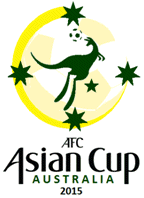Source: GG Army – Australia’s Football Fan Network
Organizers say that the 2015 AFC Asian Cup soccer tournament, to be participated in by teams from the member countries of the Asian Football Confederation will be held from January 9 to 31 in various places in Australia, can be a ticket sales success despite being held during one of the busiest periods in Australian sports.
The Asian Cup finals that year will go head-to-head with the Australian Open tennis tournament, a planned test cricket series against India, and the domestic Twenty20 competition.
Australia is also set to host the 2015 Cricket World Cup after the Asian Cup finishes – perhaps starting as soon as a fortnight after the soccer final.
While Socceroos matches are virtually guaranteed to sell out, other group games in the 16-nation tournament face intense competition to attract fans and interest.
But Asian Cup local organizing committee chief executive Michael Brown is confident the tournament to be held in Sydney, Melbourne, Queensland and Canberra can cut through early 2015’s crowded sporting landscape.
“It’s a busy year. We’ve got a T20, we’ve got a cricket World Cup, but the example I use is the (Sydney) Olympics – we all went, I can’t remember what I saw, but I had a great time,” Brown said.
“Mobilizing communities to come for the event, rather than the game … people will go if there’s an experience to be had.
“There are people who are passionate football supporters, we’ve got to appeal to them.
“But there are those who will come because it’s an event.”
The Socceroos will be in one of four groups in the 16-team finals tournament, and will play one group match each in Melbourne, Sydney and Queensland.
The tournament’s opening match will be held in Melbourne, with the semi-finals and final to be played in Sydney.
Stadium deals are still being finalized.
In Sydney, ANZ Stadium, Allianz Stadium and Parramatta Stadium are being considered; Melbourne matches could be played at Etihad Stadium or AAMI Park, while Suncorp Stadium in Brisbane, Skilled Park at the Gold Coast and Canberra Stadium are all options.
Brown believes the tournament will bring unprecedented business opportunities for Australia, with two of our four biggest trading partners – Japan and South Korea – already guaranteed a place.
Australia’s biggest trading partner, China, would appear a safe bet to qualify through the group stages.
Selling games between lower-profile Asian nations is perhaps the committee’s biggest challenge – Brown saying being “creative” is the way forward.
He has earmarked tapping into Australia’s overseas-born communities of participating nations, and ideas such as gold coin donations for entry to some matches, as ways to build support.
Organizers say more than 45,000 international visitors are expected for the tournament.



